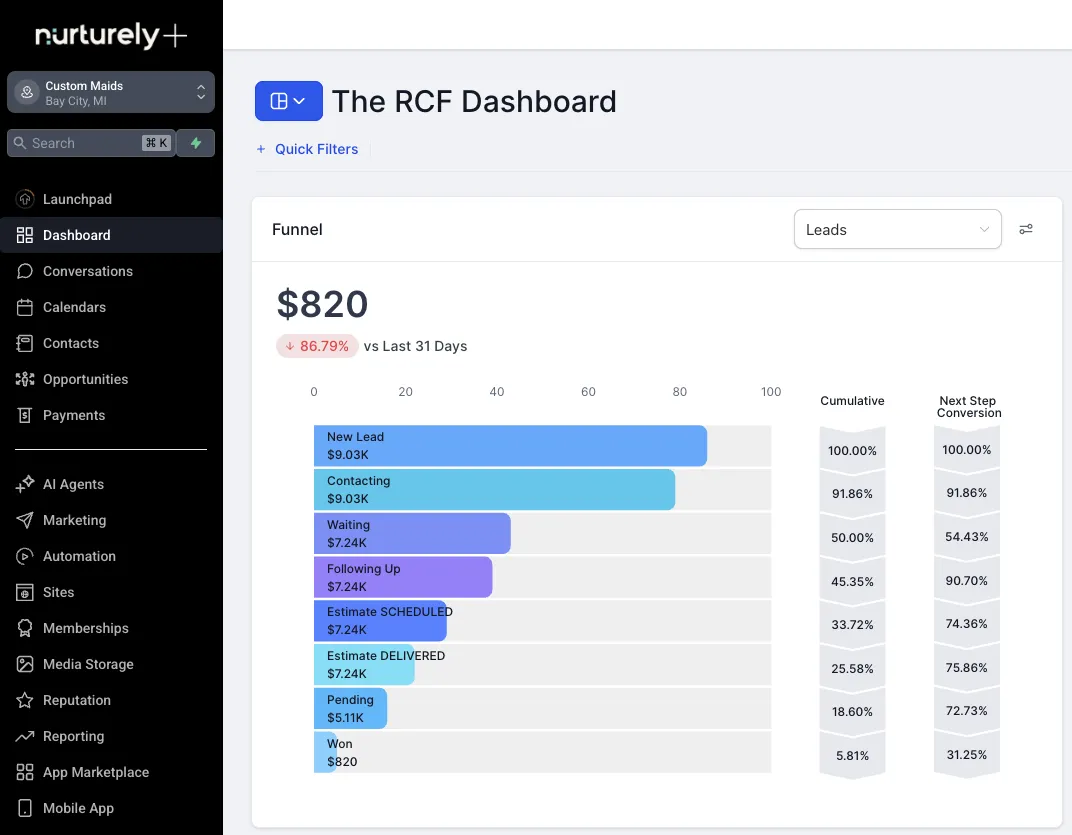Proven Construction Marketing Strategies
10 Proven Construction Marketing Strategies for 2025
In today's competitive landscape, building a successful construction business requires more than just quality craftsmanship; it demands a robust marketing blueprint.
Gone are the days of relying solely on word-of-mouth. To secure a steady pipeline of high-value projects, contractors need a multi-channel approach that builds visibility, establishes trust, and consistently generates leads.
From harnessing the power of local SEO to creating strategic industry partnerships, the right construction marketing strategies are the foundation of sustainable growth.
This article lays out 10 proven strategies, moving beyond generic advice to provide actionable steps, real-world examples, and expert tips tailored specifically for general contractors, remodelers, and specialty trades. We will cover a comprehensive range of tactics, including showcasing your project portfolio, optimizing your digital presence, and leveraging powerful referral programs. Whether you're a plumber, roofer, or landscaper aiming to dominate your local market or a general contractor looking to expand into new sectors, this guide provides the tools you need. Consider this your blueprint for constructing a more profitable future.
Table of Contents
10 Proven Construction Marketing Strategies for 2025
1. Showcase Project Portfolio & Case Studies
How to Implement This Strategy:
2. Digital Marketing & SEO Optimization
How to Implement This Strategy:
3. Referral Programs & Word-of-Mouth Marketing
How to Implement This Strategy:
4. Social Media Marketing & Visual Storytelling
How to Implement This Strategy:
5. Strategic Partnerships & Industry Networking
How to Implement This Strategy:
6. Direct Mail & Targeted Local Advertising
How to Implement This Strategy:
7. Customer Reviews & Online Reputation Management
How to Implement This Strategy:
8. Educational Content Marketing & Thought Leadership
How to Implement This Strategy:
9. Trade Shows & Industry Event Marketing
How to Implement This Strategy:
10. Vehicle Branding & Job Site Marketing
How to Implement This Strategy:
Top 10 Construction Marketing Strategies Comparison
1. Showcase Project Portfolio & Case Studies
In construction, your finished work is your most powerful sales tool. A well-documented project portfolio and detailed case studies transform abstract capabilities into tangible proof of quality, skill, and reliability. This is one of the most fundamental construction marketing strategies because it directly addresses a client's primary concern: "Can you deliver the results I need?" A strong portfolio builds immediate trust and visually demonstrates your expertise, moving beyond simple claims to showcase real-world success.

This strategy is especially effective for contractors specializing in high-value residential or complex commercial projects where visual appeal and proven experience are critical decision-making factors. By presenting a library of successful projects, you give potential clients a clear vision of what to expect, justifying your pricing and setting you apart from lower-bid competitors.
How to Implement This Strategy:
Invest in Professional Photography & Videography: High-quality visuals are non-negotiable. Hire a professional to capture your best work, including dramatic before-and-after shots, aerial drone footage, and detailed close-ups of craftsmanship.
Document the Entire Process: Don't just show the finished product. Capture key milestones, problem-solving moments, and the team in action. This tells a more compelling story of your process and professionalism.
Create Detailed Case Studies: Go beyond images. For key projects, write a brief case study outlining the client's initial challenge, your proposed solution, the project timeline, and the final outcome. Include a client testimonial for maximum impact. A great example is Turner Construction's project portfolio, which details the scope and scale of their major builds.
2. Digital Marketing & SEO Optimization
In today's digital-first world, your online presence is your new storefront. A comprehensive approach to digital marketing and search engine optimization (SEO) ensures that when potential clients search for construction services, your company appears prominently. This is one of the most critical construction marketing strategies because it places your business directly in the path of motivated buyers actively seeking solutions, from a homeowner looking for a remodeler to a developer searching for a commercial builder.

This strategy is essential for any contractor aiming for consistent, high-quality lead generation. It allows you to compete on more than just word-of-mouth referrals, capturing a wider audience and establishing your authority online. Whether it's ranking for "roofing company in [City]" or running targeted ads for "commercial concrete contractors," a strong digital footprint drives measurable growth and positions you as a modern, accessible industry leader.
How to Implement This Strategy:
Focus on Local SEO: Optimize your website and Google Business Profile for local search terms. This includes using city and service-specific keywords (e.g., "HVAC repair in Denver") throughout your site and building local citations.
Create Service-Specific Landing Pages: Develop dedicated pages for each core service you offer, like "Kitchen Remodeling," "Deck Building," or "Commercial Fit-Outs." This improves user experience and helps you rank for more specific, high-intent search queries.
Leverage Content Marketing: Regularly publish helpful content on a blog. Write articles that answer common client questions, such as "How to Choose a General Contractor" or "Seasonal Maintenance Tips for Your Home." This builds trust and attracts organic traffic.
Manage Online Reviews: Actively encourage satisfied customers to leave reviews on Google, Yelp, and other relevant platforms. Promptly and professionally respond to all reviews, both positive and negative, to show you value client feedback. A great resource for SEO best practices is Moz's Beginner's Guide to SEO.
3. Referral Programs & Word-of-Mouth Marketing
In an industry built on trust and reputation, word-of-mouth is often the most powerful lead generator. A formalized referral program transforms passive client satisfaction into an active, systematic engine for new business. This is one of the most cost-effective construction marketing strategies because it leverages your existing network of happy clients, trusted suppliers, and industry partners, turning their credibility into your sales advantage. A strong referral system ensures a steady stream of high-quality, pre-qualified leads.

This strategy is indispensable for any contractor, from a residential remodeler to a large-scale commercial builder. Leads from referrals typically have a higher closing rate and come with built-in trust, shortening the sales cycle. For instance, a home builder might offer a significant credit for a successful new home referral, while a specialty contractor could build a powerful network by partnering with complementary trades like electricians and plumbers for mutual client recommendations.
How to Implement This Strategy:
Formalize Your Ask: Don't leave referrals to chance. The best time to ask is at project completion when client satisfaction is at its peak. Systemize this by including a referral request as part of your final project sign-off process.
Offer Meaningful Incentives: Your incentive must be valuable enough to motivate action. This could be a cash bonus, a gift card, a discount on future services, or a donation to a charity of their choice. The key is to make the reward compelling for your specific audience.
Create Mutually Beneficial Partnerships: Actively build referral agreements with non-competing businesses that serve the same clients, such as real estate agents, architects, or property managers. Ensure the relationship is a two-way street. These tactics are essential for growth, as detailed in this guide on how to generate roofing leads.
Track and Acknowledge Everything: Use a simple spreadsheet or CRM to track where referrals come from. This helps you identify your most valuable partners. Always thank the referrer promptly, regardless of whether the lead closes, to encourage future recommendations.
4. Social Media Marketing & Visual Storytelling
Social media offers a direct line to your community and potential clients, transforming how contractors engage with their audience. By focusing on visual storytelling, you can turn platforms like Instagram, Facebook, and LinkedIn into powerful showcases for your work, company culture, and expertise. This is a crucial one of the modern construction marketing strategies because it humanizes your brand, builds a loyal following, and keeps your company top-of-mind for both residential and commercial prospects in a visually compelling way.

This strategy is exceptionally effective for building brand awareness and trust over time. While a project portfolio showcases finished work, social media tells the ongoing story of your business. It allows you to demonstrate expertise through educational content, connect with the community via local engagement, and attract talent by highlighting your team. Think of it as an open house for your business, available 24/7.
How to Implement This Strategy:
Choose the Right Platforms: Don’t try to be everywhere. Focus on where your clients are. Instagram and Facebook are perfect for visual B2C content like home remodels, while LinkedIn is ideal for B2B networking and sharing articles on commercial construction trends.
Showcase the Process, Not Just the Product: Use time-lapse videos to show a build from start to finish. Post Instagram Stories for daily progress updates or quick "how-to" tips. This content is authentic and highly engaging.
Humanize Your Brand: Post team member spotlights, celebrate company milestones, and share behind-the-scenes moments. People hire people, and showing the faces behind the work builds a powerful connection. For example, influencers like Matt Risinger use social media to share building science knowledge and project insights, building massive authority.
Engage Authentically: Respond to comments, answer questions in DMs, and run polls to ask your audience for their opinions. Use local hashtags (e.g., #AustinContractor) to connect with your immediate community and increase visibility.
5. Strategic Partnerships & Industry Networking
In the construction industry, who you know is often as important as what you know. Building a robust network of strategic partnerships creates a powerful, self-sustaining referral engine that generates leads without a direct marketing spend. This is one of the most effective construction marketing strategies because it leverages the trust and credibility of others. A recommendation from a respected architect, supplier, or real estate agent carries immense weight with potential clients, often bypassing the typical vetting process and putting you at the front of the line.
This approach is invaluable for all types of contractors, from residential builders seeking connections with real estate agents to large commercial firms partnering with architectural designers. By aligning with non-competing businesses that serve the same clientele, you create mutually beneficial relationships where everyone wins. For example, a roofer who partners with a local insurance adjuster can gain access to a steady stream of storm damage repair leads.
How to Implement This Strategy:
Identify Complementary Partners: Map out your project lifecycle and identify key players. This could include architectural firms, interior designers, real estate agents, property managers, material suppliers, and even specialized sub-trades like plumbers or electricians.
Provide Value First: The foundation of any strong partnership is mutual benefit. Don't just ask for referrals; find ways to provide value to your partners first. Refer clients to them, share industry insights, or collaborate on marketing content.
Join Industry Associations: Actively participate in local chapters of organizations like the Associated General Contractors (AGC) or the National Association of Home Builders (NAHB). These groups are epicenters for networking with influential industry figures and potential partners. Organizations like BNI (Business Network International) provide a structured framework for generating referral business.
6. Direct Mail & Targeted Local Advertising
In an increasingly digital world, a tangible piece of mail can cut through the noise and capture a homeowner's or property manager's undivided attention. Direct mail and targeted local advertising allow you to physically place your brand into the hands of ideal clients in specific, high-value geographic areas. This is a powerful component of a well-rounded set of construction marketing strategies because it excels at hyper-local targeting, something digital ads can struggle to replicate with the same precision and impact.
This strategy is particularly effective for contractors whose services are tied to property age, location, or recent events. A roofing company can blanket a neighborhood hit by a hailstorm, or a remodeling contractor can target homes built in the 1980s that are due for a kitchen update. The physical nature of mail builds a sense of legitimacy and can feel more personal and trustworthy than a fleeting online ad, making it a reliable way to generate high-quality, local leads.
How to Implement This Strategy:
Define Hyper-Specific Target Areas: Use data to identify your ideal targets. This could be neighborhoods with older homes for remodelers, new developments for landscapers, or areas with recent storm damage for roofers. Use local property records or a list broker to acquire mailing lists.
Design High-Quality, Compelling Mailers: Your mail piece is a physical representation of your work quality. Use professional-grade cardstock, high-resolution images of your best projects, and a clean, professional design. Avoid looking cheap, as this will reflect poorly on your brand.
Craft an Irresistible, Time-Sensitive Offer: Give recipients a clear and compelling reason to act now. This could be a seasonal discount, a free estimate or consultation, or an exclusive neighborhood-specific package. A clear call-to-action is essential.
Integrate with Digital Campaigns: Don't let your direct mail campaign exist in a vacuum. Create a unique landing page for mail recipients (e.g.,
yourwebsite.com/offer) and use QR codes to bridge the physical-to-digital gap. You can also run digital ads targeting the same zip codes you are mailing to.
7. Customer Reviews & Online Reputation Management
In today's digital world, a potential client's first step is often to search for a contractor online. What they find can make or break your business. A systematic approach to managing online reviews is one of the most critical construction marketing strategies because it directly builds trust and social proof. Your online reputation is your digital handshake, assuring clients of your reliability and quality before they even contact you.
This strategy is vital for all construction businesses, from residential remodelers to large-scale commercial builders. A wealth of positive, authentic reviews on platforms like Google, Houzz, and Yelp acts as a powerful magnet for new leads. It validates your expertise, justifies your pricing, and provides a significant competitive advantage over contractors who neglect their digital presence.
How to Implement This Strategy:
Systematize Your Review Requests: Don't leave reviews to chance. Implement a process to request a review from every satisfied client immediately upon project completion when their positive feelings are strongest. Use email or text message automation to simplify the process.
Make It Easy for Clients: Provide a direct link to your preferred review platform (like your Google Business Profile). The fewer clicks a client has to make, the more likely they are to leave a review. Remove any friction from the process.
Engage with All Feedback: Respond professionally and promptly to every review, both positive and negative. Thank clients for positive feedback and address negative comments constructively by taking the conversation offline to find a solution. This shows you value customer satisfaction. For a deeper look into this process, explore these insights on brand reputation management.
Showcase Your Best Reviews: Feature your 5-star reviews and heartfelt testimonials on your website's homepage, service pages, and in your social media content. This turns your happy customers into your most effective sales team.
8. Educational Content Marketing & Thought Leadership
Instead of just selling your services, you can build authority and trust by teaching potential clients. Educational content marketing involves creating and sharing valuable information that helps your audience understand complex topics, solve problems, and make better decisions. This is one of the most effective construction marketing strategies for long-term growth because it positions your company as a trusted advisor, not just a vendor. When clients feel educated and empowered, they are more likely to choose the expert who provided that value.
This strategy is perfect for contractors who want to attract discerning clients who value expertise over the lowest price. By creating content that answers common questions-like "How to Budget for a Kitchen Remodel" or "What to Look for in a Commercial Builder"-you attract qualified leads early in their decision-making process and build a relationship before they even request a quote.
How to Implement This Strategy:
Address Common Client Questions: Brainstorm a list of questions you frequently hear from clients. Create blog posts, checklists, or short videos answering each one, such as a roofer creating a seasonal roof maintenance guide.
Explain Complex Concepts Simply: Break down industry jargon and complex processes. A commercial contractor could write an article explaining recent building code changes and what they mean for business owners. Use simple language and visuals to make it easy to understand.
Create High-Value Guides & Checklists: Develop downloadable resources like a "Home Renovation Planning Guide" or a "New Construction Checklist." These "lead magnets" are excellent for capturing contact information for your email list.
Leverage Modern Content Tools: Creating high-quality content consistently can be challenging. Exploring options like AI content creation tools can help you scale your content production while maintaining quality and relevance for your audience.
9. Trade Shows & Industry Event Marketing
In an increasingly digital world, face-to-face interaction remains a powerful tool for building trust and closing deals. Strategic participation in trade shows, industry conferences, and local events allows you to connect directly with potential clients, partners, and suppliers. This is one of the most effective construction marketing strategies for creating high-quality personal connections, as it moves your brand from a name on a screen to a tangible, trustworthy presence.
This approach is invaluable for contractors of all types, from residential builders exhibiting at local home and garden shows to large commercial firms attending major industry conferences like the International Builders' Show (IBS). It provides a focused environment where attendees are actively seeking solutions, giving you a prime opportunity to demonstrate your expertise, showcase your quality, and capture qualified leads in real time.
How to Implement This Strategy:
Choose Events Strategically: Don't attend every event. Focus on those that attract your ideal client demographic. A high-end custom home builder will benefit more from a luxury home show than a general contractor trade expo.
Create an Engaging Booth: Your booth is your temporary showroom. Use high-impact visuals of your best projects, interactive displays (like a VR walkthrough), and professional signage. Make it an inviting space where people want to stop and talk.
Develop a Lead Capture System: Don't let conversations go to waste. Use a simple digital form on a tablet or a classic fishbowl for business cards to collect contact information. Offer a compelling reason for them to share it, like a free consultation or entry into a giveaway.
Plan for Follow-Up: The real work begins after the event. Have a plan to follow up with every lead within 48 hours. A personalized email referencing your conversation is far more effective than a generic blast.
10. Vehicle Branding & Job Site Marketing
Your company vehicles, equipment, and active job sites are powerful, constantly moving billboards. Utilizing them for branding is a highly effective, low-cost marketing strategy that turns existing assets into lead-generation machines. This approach is one of the most practical construction marketing strategies because it creates continuous, hyper-local brand exposure. Every trip to a supplier and every day spent on a project becomes an opportunity to capture the attention of potential clients in your direct service areas.
This strategy is indispensable for contractors who operate locally, such as roofers, landscapers, plumbers, and residential builders. When a neighbor sees your professionally wrapped truck parked at a home for days, it builds familiarity and trust. It signals that you are active, in-demand, and a legitimate local business, prompting them to call when they need similar work done.
How to Implement This Strategy:
Invest in Professional Wraps and Signage: Avoid cheap magnets or poorly designed decals. A professional, full or partial vehicle wrap conveys quality and permanence. Similarly, use professionally printed, durable job site signs that clearly display your logo, phone number, and website.
Keep Your Branding Consistent and Clear: Your branding should be instantly recognizable across all assets, from trucks and trailers to employee uniforms and site signs. Ensure your company name, contact information, and key services are large, legible, and easy to read from a distance.
Maintain a Professional Appearance: A clean, well-maintained truck and an organized, tidy job site are direct reflections of your brand's professionalism. A dirty vehicle or a messy worksite can actively harm your reputation and undermine your marketing efforts.
Be Strategic with Placement: Park branded vehicles in high-visibility areas when on a job site or even when parked at your office. Place job site signs where they will get the most traffic, such as on corner lots or facing main roads, to maximize impressions.
Top 10 Construction Marketing Strategies Comparison

Unifying Your Strategy for Maximum Impact
We have explored a wide range of powerful construction marketing strategies, from building a stunning project portfolio to leveraging the subtle power of vehicle branding on a busy street. Each tactic, whether it's optimizing your website for search engines or networking at a local trade show, holds the potential to attract new clients and grow your business. However, viewing these strategies as isolated items on a checklist is a common mistake that limits their true potential. The most successful contractors understand that these efforts are not separate channels; they are interconnected components of a single, powerful marketing engine.
Think of it this way: a compelling case study on your website (Strategy #1) is significantly more impactful when it's discoverable through strong SEO (Strategy #2). That same case study can then be shared on social media to showcase your expertise (Strategy #4), inspiring a past client to leave a positive review (Strategy #7) and refer you to a friend (Strategy #3). This synergistic effect is where exponential growth happens.
From Blueprint to Reality: Putting Your Plan into Action
The key takeaway is that integration is not just a buzzword; it is the cornerstone of effective marketing in the construction industry. A disconnected approach leads to wasted effort, inconsistent messaging, and a confusing journey for potential customers. When your digital presence, offline outreach, and reputation management work in concert, you create a seamless and trustworthy brand experience that sets you apart from the competition. Mastering these concepts is valuable because it transforms your marketing from a cost center into a predictable, revenue-generating asset for your company.
To get started, don't feel pressured to implement all ten strategies at once. Instead, follow this actionable plan:
Conduct a Self-Audit: Review the strategies discussed and identify the two or three that represent the biggest opportunities for your business right now. Perhaps your online reviews are lacking, or your website hasn't been updated in years.
Implement and Measure: Focus your resources on executing those selected strategies with excellence. Set clear, measurable goals. For example, aim to acquire 10 new five-star reviews in the next quarter or increase website traffic from organic search by 20%.
Integrate and Expand: Once you see positive results, begin layering in complementary strategies. If your SEO efforts are paying off, start an educational blog (Strategy #8) to capture more long-tail keywords. If your referral program is working, support it with a targeted direct mail campaign (Strategy #6) to remind past clients of your services.
Building a dominant construction brand is much like building a sturdy structure. It requires a solid foundation, a detailed blueprint, and the right tools to connect every piece. By thoughtfully selecting and unifying these construction marketing strategies, you are not just chasing leads; you are constructing a resilient and profitable future for your business, one project at a time.
Ready to unify your marketing efforts and build a predictable pipeline of high-quality leads? Nurturely Plus provides an all-in-one platform designed to help contractors manage their SEO, social media, customer reviews, and lead follow-up from a single dashboard. Stop juggling multiple tools and start building a seamless marketing system by exploring Nurturely Plus today.



